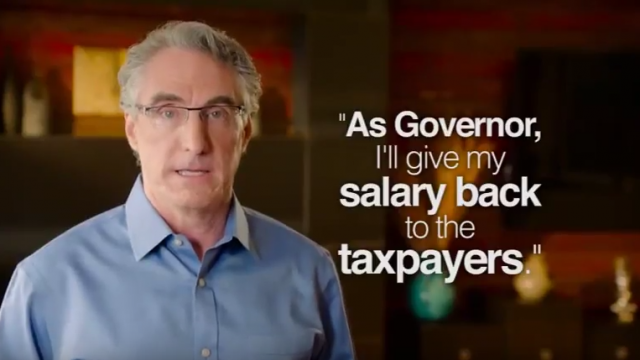Is Doug Burgum's Promise To Decline Or Return The Governor's Salary If Elected Even Legal?

https://www.youtube.com/watch?v=1kId6dDu6CY
In a campaign ad released yesterday NDGOP gubernatorial candidate Doug Burgum is promising to decline his salary if elected governor.
The thing is, that might not actually be legal, though nobody seems to know for sure.
As far as accepting the salary, it seems clear that Burgum would have to. It’s essentially a separation of powers issue. Salaries for the state’s various public offices, up to and including the governor, are set by the Legislature. Thus the governor cannot change the salary – in Burgum’s case reducing it to zero – without the approval of the Legislature.
In a legal opinion issued by Attorney General Robert Wefald way back in July of 1982, he found that an offer to refuse salary by a candidate was not only impossible for anyone but a legislative candidate (and even then they could only promise to vote for legislation to eliminate salaries) but it was a violation of North Dakota’s corrupt practices act. Because declining a salary is tantamount to offering voters something of value in exchange for their votes.
The pertinent excerpt:

In 1994 Attorney General Heidi Heitkamp issued an opinion partially superseding Wefald’s. She found (rightly, I think) that subjecting a campaign promise about salary to the state’s corrupt practices act would be a 1st amendment violation:

But Heitkamp left in place the portion of Wefald’s opinion dealing with the ability of elected officials to decline their salary. In a 2005 opinion Attorney General Wayne Stenehjem (who is, ironically enough, Burgum’s opponent in this race) held that a lawmaker could not get around a law prohibiting their appointment to a position for which the pay has been increased by declining that pay increase.
Because, as Stenehjem wrote alluding to Wedfald’s opinion, it is illegal for elected officials to decline some or all of their salary:

But Burgum could accept the salary and then turn around and give it back. Mike Nowatzki quotes Burgum campaign manager Kate Mund as saying the candidate “will write a check back to the state general fund if he has to,” but it’s not clear how that could actually happen.
While the federal government has a long-established fund to accept voluntary donations and gifts to the government (that’s really a thing, I guess), the creation of it required an act of Congress. A similar fund in North Dakota would also require legislative action, for obvious reasons. Usually every revenue stream the state has – be it taxes or fines of fees – is accounted for by the Legislature which describes how those revenues are collected and what sorts of spending they’re available for.
[mks_pullquote align=”right” width=”300″ size=”24″ bg_color=”#ffffff” txt_color=”#000000″]…this is the sort of a promise only an independently wealthy candidate can make. If we allow Burgum to give back his salary, it gives all uber-rich candidates a fundamental advantage. They can refuse the salary while others can’t.[/mks_pullquote]
As near as I can tell after discussions with state officials, the Legislature has created no specific mechanism for someone simply donating money back to the state.
“It’s a good question,” Tax Commissioner Ryan Rauschenberger told me saying he’s never heard of someone wanting to give money to the state before. “[Burgum] would likely have to accept his salary and write a check back. What agency does it go to? The state accepts collections, but they’re collections authorized by law.”
“It would be a taxable event,” he added, saying that Burgum would have to account for any accepted salary for tax purposes even if he gave it back.
Pam Sharp, the director of the Office of Management and Budget, was as uncertain as Rauschenberger when I spoke to her about it.
“We haven’t had that situation yet, so we don’t have exactly how you would do it,” she told me. “We would need legal advice to do it the right away.”
She did say, speaking off the top of her head, that there were two potential ways for Burgum to accomplish it. He could “write a check back to the state of North Dakota and deposit it in the general fund,” she said. Or they could “document that the elected official acknowledges that the statute says he is entitled to receive the salary but refuses it.”
The latter option would seem to be precluded by the aforementioned legal opinions. The previous option would probably be the route Burgum would have to take, assuming it’s legal, which doesn’t seem very clear right now.
I think it’s kind of a shallow campaign promise. What does it accomplish? The governor’s salary isn’t particularly high compared to other states (we’re just slightly above the national average), and it’s a rounding error in terms of the overall state budget.
Plus, this is the sort of a promise only an independently wealthy candidate can make. If we allow Burgum to give back his salary, it gives all uber-rich candidates a fundamental advantage. They can refuse the salary while others can’t.




